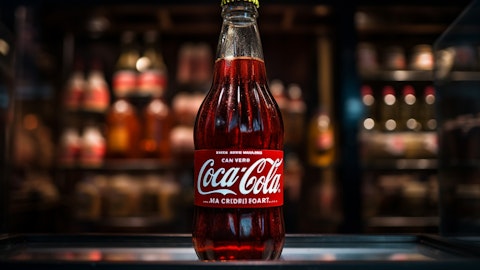Martin Arias: I just, I would comment that also, we have a unique opportunity in that format that others don’t. A typical hard discount does not have convenience categories. Part of the reason they don’t do that is, because of the distribution model and a variety of other reasons. We already have that. It’s already built. So adding the convenience categories to our Bara offering just strengthens the Bara offering. But we like to refer to it internally more as a soft discount now, because we don’t necessarily feel the need to follow every single rule of hard discount. And we tend to be a little bit more pragmatic and agnostic about certain things, particularly, because we can bring a whole set of capabilities to that business that others can’t.
Another example is financial services and executing services within the store. Very few people can bring that to a hard discount model and create that network effect that today we have at OXXO, and marginally, it doesn’t add any cost to what we’re doing in OXXO.
José Antonio Fernández: I would add that that competitive advantage is an important segment. The service is part of Bara. It’s an important – it doesn’t – it’s not as big as in an OXXO, but it’s growing. And we’ve been very smart about making sure it doesn’t intervene with the rest of the value proposition of Bara to not affect the discount buyers of the store. So I think, we serve both consumer occasions very well in Bara, and that’s something that on you.
Robert Ford: Those are very important points of differentiation. And then just with respect to how you’re tackling the beverage category in Bara, in terms of the importance of private label and how you’re finding the opening price points, or do you stick to all branded, in paper?
José Antonio Fernández: My belief, and from talking to experts in the industry, private label works fantastic in almost all categories, one of the toughest ones. And you’ve seen it in Walmart. You’ve seen it in other discounters. I am of the belief that private label in beverage, other than water and other categories, we like working with the big players that, you know, the cost of carrying that and putting that cost in place, I’d much rather stay with the big players in beverages. I do think private label serves a huge purpose in almost all other categories.
Martin Arias: And it has nothing to do with our ownership going forward with FEMSA. Just really – what the consumer is demanding in those products are the national brands, and so we will provide them. The fact is, OXXO does have some private label beverages, but they generally are a very small niche of the total beverage portfolio that we offer.
Robert Ford: Makes sense. José, Martin, thank you both very much.
Martin Arias: Thank you.
Operator: Thank you. Our next question is from Rodrigo Alcantara with UBS. Please go ahead.
Rodrigo Alcantara: Hi, guys. Thanks for taking my question, Juan and José. My question would be for you, José. Just if I perceive correctly on Carlos Laboy’s question, I mean, you mentioned focus on OXXO lifetime, right, and U.S. could be over time. I mean, does this mean that in your view or you know U.S. as a priority maybe get a step backwards in terms of priorities, perceive correctly or not? And on the other hand, I’m curious that we have not heard about Europe, perhaps Valora, which has performed amazingly, right, over the last few quarters, a very nice surprise. So also just curious here is why it’s just coincidence that Valora was not being discussed here. That would be my question, José? Thank you very much.
José Antonio Fernández: Thank you, Rodrigo, for your question. It’s good for me to clarify. First, I am very excited about the U.S. But I think the U.S. in general terms when you talk to convenience is like saying, it’s very generic term. U.S. is huge in the convenience store market. Its 160,000 convenience stores with very different dynamics, and demographics and styles of stores as you move geographically and from rural to urban. So I would say am I excited in the U.S.? That’s very general. I am very excited about certain parts in the U.S. Particularly, I am very excited about the border towns, towns that I know well, that I’ve known since ever, and they are very much familiar with the OXXO brand and the OXXO capability.
And I believe and what we’ve talked to people in those border towns, they will be very excited to have the opportunity to have the OXXO value proposition on both sides of their – basically their own city already. So I’m very excited about the potential of the border towns or near border towns for OXXO expansion. And we have a team in place and we’re working hard on how to tackle that. I am also excited about exploring certain regions of the U.S. where I see interesting dynamics still very attractive for convenience store expansion. If you look at the Southwest without California, and the Southeast without Florida, there’s not a lot of density. It’s where there’s less competition. That’s where I see the fuel dynamics taking a longer time to change.
I think that fuel as a value for traffic will keep – I mean, I think for many, many years in the U.S. but in particularly in those regions, it will be very resilient. So I’m also exploring not necessarily with the OXXO brand, but are there any value or interesting small or medium potential acquisitions where we could transfer the capabilities that OXXO has and provide value. I’m excited about some of our assortment capabilities, or pricing capabilities. And frankly, our purchasing negotiation capabilities, because we’re a huge player of many of the beverage and tobacco, and many of the categories that are already here South of the border, and maybe we can play a play. So I’m excited about it. I’m just super excited about how close we are, to a very interesting expansion in South America.
And Europe is a very interesting place for us. We bought a company that has superb management, and you’re seeing it with the results. They’ve done a tremendous job in really finally capturing the potential that they have, and I still see a lot of potential bottom line growth. We have some assets in the Valora portfolio in food service that are quite frankly impressive in terms of, for a while profitability. And one of the big challenges that the team has, is can we grow them? Can we grow them organically? We need to grow organically our [Brett Silconic] business, our Frittenwerk business. I think there could be a very interesting surprise for Valora going forward and many more quarters like this one. So I’m very excited about Valora as well.
Rodrigo Alcantara: Awesome. That was a great call to understand your thinking also. And last one, apologies for violating certain rules. I mean we have seen you very active on the Health division, right? You were recently in Chile visiting Cruz Verde, et cetera. I mean just curious, share your thoughts on what to do or the areas for improvement in Mexico in the Health division. How do you see M&A feeding in the Health division? That would be my last question. Thank you very much, José.
José Antonio Fernández: No, the Health division particularly in Mexico is going through some challenges in terms of competition. I mean let’s not forget we had very successful years, many years of profitable growth and hitting our stride. But I think we had one type of pharmacy format in Mexico and we believe now we have the right system in place to begin, to develop another type of pharmacy format that has worked fantastically for us in Chile. We’re really turning around Ecuador with our more, better developed store version and we think Mexico is ready for a need for our food beverage store version that really captures all the value that we can bring in health and beauty, in pharmacy. And so, we are planning to roll out organic expansion on that level. We’ve always looked for potential opportunities in organic opportunities in Mexico. But right now we’re very much focused in getting more accelerated expansion in a bigger format of stores in pharmacies in Mexico.
Rodrigo Alcantara: Awesome. Thank you very much, José.
José Antonio Fernández: Thank you.
Operator: Thank you. Our next question is from Renata Cabral with Citigroup. Please go ahead.
Renata Cabral: Hi, everyone. Thanks for taking my question. This is about Spin by OXXO. So the platform was launched in 2021 and it’s reached an impressive number of almost 11 million users. So I’d like to ask you if you can share the opportunities you are seeing going forward, in terms of eventual partnership with banks, expansion of service and even, you know, the number of users that already reached 11 million right now? So thank you.
Martin Arias: Yes, I’ll take that question. Look, the entire Spin ecosystem is not only a great financial opportunity for FEMSA or business opportunity for FEMSA. It’s a strategic necessity. And I would look at it as an entire ecosystem. I think it all works together. So I wouldn’t focus just on Spin by OXXO. The idea is that eventually that ecosystem will grow outside of the store. It’s sensible for it. It contributes to the store in very positive ways. For example, as I mentioned earlier, the loyalty program. But our vision of combining Spin by OXXO, Spin Premia and our NetPay business, is to be able to go outside the store, to offer a complete solution to other particularly small businesses, where they can also have their own loyalty program.
Where they can also have their point of sale terminal through, which they can transact and provide services themselves, a payment of services. And our idea is as a strategic necessity, we need this business to protect and enhance the value proposition in OXXO. And as a business opportunity, it’s taking it outside the store with all these different components that I’ve mentioned. Our new CEO in that business, Juan Carlos Guillermety, will be speaking on this call at some point during this year. And he will share with you his vision. He’s brought a new focus on very specific areas of opportunity for that business, which he will share with you the next time, when he participates on this call. And in addition, I have been very pleasantly surprised at how he has taught the organization, about key areas where we can be saving a significant amount of money, which is obviously the money that we can redeploy, in more productive efforts.
I hope that answers your question.
José Antonio Fernández: I think, I would just add to what Martin just said, Renata. We mentioned a little bit in the opening remarks how we are, after a few years, which you alluded to, where a lot of the focus was put on acquiring customers, right? And we had our theories of how, what kind of a role the store network would play as a tool to help us acquire customers questions have been very favorably answered. But eventually, as you move more towards monetization, and these are questions that we get all the time, how do you monetize this? Do you eventually? There’s the digital media that is, how to begin to use that data. We’re already beginning to do that and monetize it with CPG companies and other initiatives. And eventually, to Martin’s point, lending, right?


